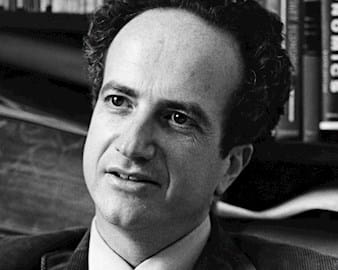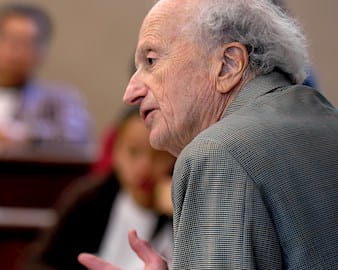
1951
Graduated from Princeton University with a bachelor’s degree in mathematics
1951
One of the foremost economics scholars of the 20th century, the late Gary Becker transformed the field by extending its impact to the study of human behavior. By applying economic frameworks to real-world issues such as crime, discrimination, and the economics of the family, he upended the definition of economics.
Born in the small coal-mining town of Pottsville, Pennsylvania, Becker spent his formative years in Brooklyn, New York, where his family’s frequent discussions of politics and justice sparked a lifelong interest in social issues.
At Princeton University, he found his future calling when he “accidentally took a course in economics.” Intrigued by the “mathematical rigor of a subject that dealt with social organization,” as he later wrote, he graduated from Princeton in just three years and went on to pursue a graduate degree in economics at the University of Chicago.
At the University of Chicago, he studied with the late Milton Friedman, whose influence on Becker was profound. “He emphasized that economic theory was not a game played by clever academicians, but was a powerful tool to analyze the real world,” Becker later wrote. “His course was filled with insights both into the structure of economic theory and its application to practical and significant questions.”
Inspired by those ideas, Becker focused his research on improving the world. His first major publication, The Economics of Discrimination, examined the economic implications of discrimination. He went on to apply economic tools to the study of labor markets, birth rates, addiction, education, crime, and other social issues.
In the early part of his career, Becker’s work on social problems was controversial. “For a long time, my type of work was either ignored or strongly disliked by most of the leading economists,” Becker wrote. “I was considered way out and perhaps not really an economist.”
But over time his ideas gained traction, eventually becoming mainstream.
“Before Becker, economics was about topics like business cycles, inflation, trade, monopoly and investment,” economist Lawrence H. Summers wrote in Time magazine shortly after Becker’s death. “Today it is also about racial discrimination, schooling, fertility, marriage and divorce, addiction, charity, political influence—the stuff of human life.”
Becker taught at the University of Chicago from 1954 until 1957, when he joined the faculty at Columbia University and the National Bureau of Economic Research. He returned to the University of Chicago in 1970 and spent the rest of his career here, joining the Chicago Booth faculty in 2002.
In addition to his scholarly work, Becker wrote monthly columns for Businessweek and ran a popular blog in collaboration with Richard Posner, a judge on the federal court of appeals and a senior lecturer at the University of Chicago Law School.

“It [economics] is judged ultimately by how well it helps us understand the world, and how well we can help improve it.”
—Gary Becker
Gary Becker’s Nobel Prize–winning work broke new ground by crossing disciplinary boundaries and applying economic principles to answer pressing questions about human behavior.